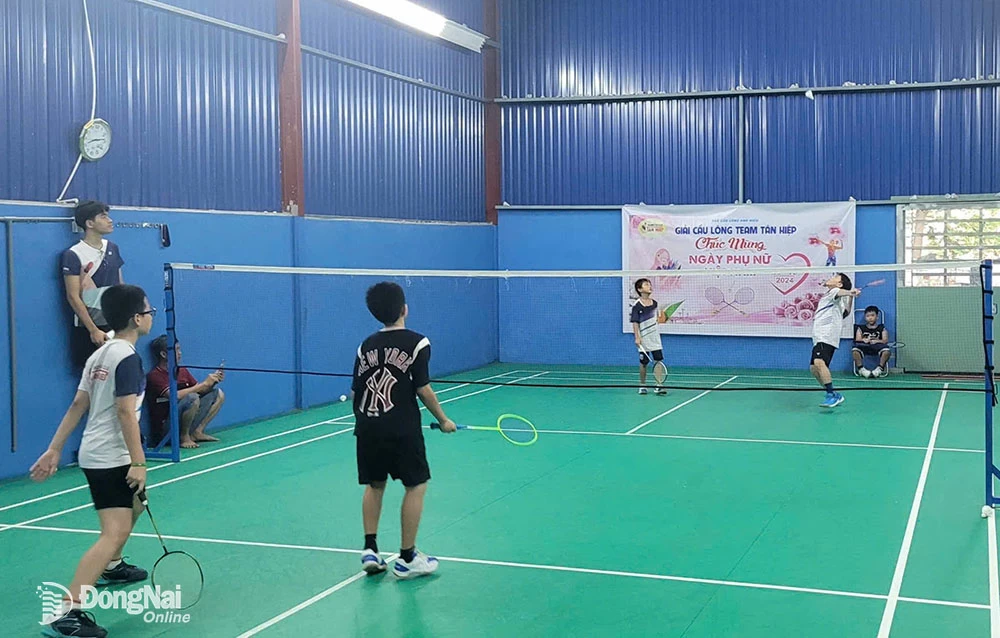 |
| Young people enthusiastically play badminton – a sport that not only improves health but also helps strengthen connections and communication skills. Photo: L. Duy |
When screens become the "living environment" of young people.
According to statistics from DataReportal in 2024, up to 92% of internet users are of legal age.
Vietnamese people aged 16-24 access social media daily, with over 70% of their online time spent watching short videos on platforms like TikTok, Facebook Reels, and YouTube Shorts. This age group has the highest and most frequent consumption of digital content, especially during summer breaks.
This situation is becoming increasingly common, especially among students – who have free time during the summer but lack direction in their activities.
Ng. Th. M., an 11th-grade student (residing in Binh Da ward, Bien Hoa city), said: “I go on TikTok every day, and each time I watch, an hour flies by without me even realizing it. Many short videos are very catchy; after watching one, another automatically appears. Sometimes, I watch while eating, and then watch until late at night before going to sleep.”
It's not just short videos; many young people spend a significant amount of their time on online games, group chats, and social media. As Tran Quynh Nhu (23 years old, residing in Trang Dai ward, Bien Hoa city) shared: “I often stay up late playing games with friends or messaging through apps. During the day, I just lie around with my phone, too lazy to leave my room. I'm also hesitant to talk to strangers in real life; I don't feel as comfortable as when interacting through a screen.”
Dr. Cao Thi Huyen, a psychology lecturer at Dong Nai University, shared that watching too many short videos can cause many psychological problems such as: reduced concentration, impaired intelligence, and negative impacts on mental health. Short videos can create a feeling of addiction, causing users to lose focus on other activities and reducing their ability to process information.
Furthermore, a lack of participation in physical activities, sports, or community engagement contributes to the shrinking of real-life experiences among young people. Instead of spending time playing outdoors, many choose to stay indoors, using electronic devices continuously for hours. This not only affects eyesight and posture but also weakens physical fitness, increases the risk of obesity, disrupts sleep patterns, and leads to lifestyle imbalances.
Many parents admit that their children are almost inseparable from their phones, interact little with family, and are no longer enthusiastic about group activities. This situation is causing many young people to gradually lose communication skills, lack confidence, easily become isolated, and even show signs of anxiety and depression. Education experts warn that if these habits are not changed soon, young people will face the risk of a comprehensive decline in both physical and mental health during a crucial developmental stage.
Ms. Lai Thi Ngoc Duyen, a lecturer in the Department of Primary and Preschool Education at Dong Nai University, advises students and young people that physical training and social interaction should be considered essential parts of the maturation process. Besides studying, young people should participate in extracurricular activities, sports, volunteer work, etc., to develop soft skills, expand their relationships, and reduce their dependence on technology in daily life.
"Rescue" yourself from the virtual world.
Dr. Cao Thi Huyen believes that protecting young people from the negative impacts of social media is not only the responsibility of schools, but also a crucial task for families. To reduce the time teenagers and children spend in front of screens, parents need to proactively create opportunities for their children to participate in beneficial activities such as reading, playing sports, learning new skills, or attending extracurricular classes. These activities not only help children develop life skills, but also cultivate patience, improve physical fitness, and enhance mental health.
In addition, age-appropriate physical activities such as swimming, badminton, basketball, cycling, and running not only help children strengthen their immune system and develop their musculoskeletal system, but also effectively relieve stress, improve sleep, and maintain a positive mental state. If these activities are maintained regularly, they will help children develop healthy habits, reduce the risk of dependence on the virtual world, and gradually guide them towards a more active and proactive lifestyle in learning and social interaction.
Sharing the same view, Ms. Lai Thi Ngoc Duyen, lecturer at the Department of Primary and Preschool Education, Dong Nai University, believes that for young children and preschoolers, the guiding role of parents is a key factor.
"Parents need to work alongside their children in choosing entertainment content and limiting screen time appropriately; at the same time, they should increase hands-on experiences such as playing with their children, doing household chores together, and participating in interactive games instead of leaving children alone with phones or televisions."
Le Duy
Source: https://baodongnai.com.vn/xa-hoi/202506/gioi-tre-can-thoat-khoi-man-hinh-de-van-dong-trong-dip-he-ad50e16/




![[Photo] Prime Minister Pham Minh Chinh presides over a meeting on private sector economic development.](/_next/image?url=https%3A%2F%2Fvphoto.vietnam.vn%2Fthumb%2F1200x675%2Fvietnam%2Fresource%2FIMAGE%2F2025%2F12%2F20%2F1766237501876_thiet-ke-chua-co-ten-40-png.webp&w=3840&q=75)
![[Photo] Prime Minister Pham Minh Chinh presides over the conference announcing the establishment of the International Finance Centre in Vietnam.](/_next/image?url=https%3A%2F%2Fvphoto.vietnam.vn%2Fthumb%2F1200x675%2Fvietnam%2Fresource%2FIMAGE%2F2025%2F12%2F21%2F1766309817714_ndo_br_dsc-3400-jpg.webp&w=3840&q=75)





































































































Comment (0)